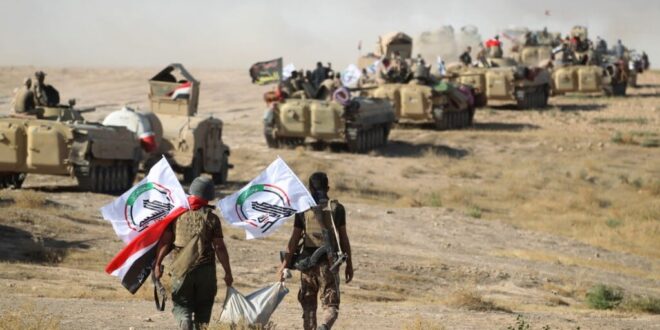Violent explosions rocked the Kalsu base in Iraq on April 19 , resulting in at least one fatality and eight wounded, but it remains unclear who exactly is responsible as U.S. Forces and Israel both denied participation in the attack.
While no party has yet claimed responsibility for the attack on the base, its ramifications on the current conflict between Israel and Iran, as well as the mounting pressure on the U.S. presence in both nations, are noteworthy. Situated near the international highway in the Babil governorate, south of Baghdad’s capital, the Popular Mobilization Forces (PMF) and the Iraqi army currently occupy the base.
The blast impacted the armored corps headquarters of the PMF. The explosions followed reported Israeli attacks targeting a sensitive site in the Iranian city of Isfahan, allegedly in response to Iran’s recent drone and missile attack targeting Israel.
The United States Central Command denied responsibility for the operation, stating in a release: “We are aware of reports claiming that the United States conducted airstrikes in Iraq today. Those reports are not true. The United States has not conducted air strikes in Iraq today.” Similarly, Israel distanced itself from the incident and denied that it struck the base.
The Iraqi Air Defense Command confirmed no sighting of drones or fighter jets in the airspace of the Babil governorate before or during the explosion. Abu Fadak al-Mohammedawi, Chief of Staff of the PMF, visited the base, where he inspected the explosion site and was briefed on the investigative committees at the site of the attack. In addition, immediately after the attack, the head of Kata’ib Sayyid al-Shuhada, Abu Alaa al-Walai, vowed to “retaliate against whoever is behind this heinous attack on the PMF site, whoever they may be.”
Linked to the attack on the base, the Islamic Resistance in Iraq, a network of Iranian-backed Shia Islamist militias, claimed that they “targeted a vital target in Eilat using a drone in response to the Zionist massacres against Palestinian civilians, and the Zionist enemy’s violation of Iraqi sovereignty by its cowardly targeting of PMF camps.” Besides publishing footage showing a drone launch, there is little evidence they targeted Eilat, nor have there been reports of Tzeva Adom (Red Alert) sirens in the area following the attack. This method of taking responsibility for attacks against Israel with minimal evidence to support the claim has become typical of the Islamic Resistance in Iraq.
American and Iraqi Security officials told Reuters that in the last 24 hours, U.S. soldiers were subjected to separate attacks using missiles and drones at the Kharab al-Jir base in northeast Syria and the al-Asad base in western Iraq. These attacks come after a nearly three-month hiatus in targeting U.S. forces in Iraq and Syria. Before the strikes, reports were suggesting that Kataib Hezbollah intended to restart its attacks on U.S. forces. This decision most likely stemmed from Prime Minister Sudani’s visit to the United States, which failed to make any significant progress towards meeting the demands of Iran-backed militias regarding the withdrawal of U.S. military presence from Iraq; instead, agreements reached were entirely contrary to the interests of Iran and its proxies, resembling deals between the Iraqi side and several U.S. companies regarding cooperation in the energy sector.
Kataib Hezbollah later denied this, which could be seen as an attempt to avoid a U.S. response. It also could be exemplified by the disagreement among Iraqi militias towards Americans. One faction advocated for giving Sudani’s government and parliament enough time to request the U.S. withdrawal from Iraq. This faction is represented by Asaib Ahl al-Haq and Badr Organization, both influential in the government and parliament. Other factions view military action as the best option. These factions include Kataib Hezbollah, Harakat al-Nujaba, and Kataib Sayyid al-Shuhada.
In the coming days, we will learn the results of the investigations conducted at the Kalsu base and whether these findings will impact the resurgence of attacks against the U.S. presence in Syria and Iraq.
 Eurasia Press & News
Eurasia Press & News



